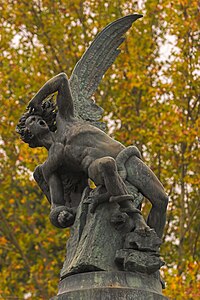Thành viên:Unpear/Thiên thần sa đoạ

Một thiên thần sa đoạ, theo giáo lý Cơ Đốc, là một thiên thần bị lưu đày hay bị trục xuất khỏi thiên đàng. Một hình phạt trục xuất thường là cho những thiên thần không vâng lời hoặc nổi loạn chống lại Thiên Chúa (xem Chiến tranh trên Thiên Đàng).
Thiên thần sa đoạ nổi tiếng nhất là Lucifer, tên thường dùng để tượng trưng cho Satan trong đức tin của đạo Cơ Đốc. This usage stems from a particular interpretation of Isaiah 14:3-20 that speaks of someone who is given the name of "Day Star" or "Morning Star" (in Latin, Lucifer) as fallen from heaven. The word Lucifer, however, does not refer to Satan anywhere in the Bible. Some see the passage as using this name to describe the king of Babylon, who had exalted himself as being deity himself, after which God would cast him down. The same terminology is used in Ezekiel to describe the king of Tyre. The Greek etymological synonym of Lucifer, Eωσφόρος (Eosphoros, "dawn-bearer")[1][2] is used of the morning star in 2 Peter 1:19 and elsewhere with no reference to Satan.
Still, Satan is called Lucifer in many later writings, notably Milton's Paradise Lost (7.131-134, among others), because, according to Milton, Satan was "brighter once amidst the host of Angels, than that star the stars among."[3]
Prospects for salvation
sửaAccording to the Catechism of the Catholic Church, angels were all created as good beings, but some decided to become evil.[4] Angels do not need faith as they already have the knowledge of celestial things, which means their action constitutes unforgivable sin.[5] Matthew 12:32 clarifies unforgivable sin as meaning that the sinner is not forgiven in "this age or the age to come." For most Christians this would not mean that those who have committed this sin may be redeemed after the passage of two ages,[6] since "the age to come" is usually interpreted to mean an eternal period after the eschaton. A minority tradition espoused by Clement of Alexandria, Origen and Gregory of Nyssa teaches that the Devil and thiên thần sa đoạs will eventually be saved.[7][8]
Origin of the term
sửaThe apocryphal Book of Enoch explains that a group of rebellious angels "left their first estate" (heaven, or the sky) and came down (fell) to Earth to marry human women and have children with them.[cần dẫn nguồn] Jude makes mention of these angels in the New Testament:
| “ | And the angels which kept not their first estate, but left their own habitation, he hath reserved in everlasting chains under darkness unto the judgment of the great day. - Jude 1:6, KJV | ” |
References
sửa- ^ ScriptureText.com
- ^ Etymonline.com
- ^ Online-Literature.com
- ^ Vatican.va, The Catechism of the Catholic Church, Number 391
- ^ Vatican.ca, The Catechism of the Catholic Church, Number 393
- ^ NewOxfordReview.org. Is Hell Closed Up & Boarded Over?, David Watt, New Oxford Review, February 1999
- ^ Allen, Thomas (1891). Universalism Asserted. Chú thích có tham số trống không rõ:
|coauthors=(trợ giúp)[cần số trang] - ^ Russell, Jeffrey (1981). Satan. Ithaca: Cornell University Press. ISBN 0801494133.[cần số trang]
Source
sửa- "Angels", Catholic Encyclopedia, 1913.
- “Catholic Encyclopedia”. New Advent.
Bibliography
sửa- Ashley, Leonard. The Complete Book of Devils and Demons Barricade Books. ISBN 1-56980-077-4
- Bamberger, Bernard Jacob, (March 15, 2006). Fallen Angels: Soldiers of Satan's Realm, 300pp. ISBN 0-8276-0797-0
- Davidson, Gustav, 1994. A Dictionary of Angels: Including the Fallen Angels. Free Press. ISBN 0-02-907052-X
External links
sửa- NewAdvent.org, Catholic Encyclopedia
- JewishEncyclopedia.com